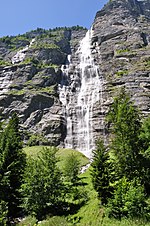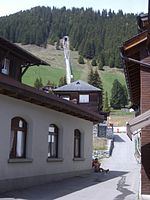FIS Alpine World Ski Championships 1931
1931 in Swiss sport1931 in alpine skiingAlpine skiing competitions in SwitzerlandFIS Alpine World Ski ChampionshipsFIS Alpine World Ski Championships 1931 ... and 2 more
February 1931 sports eventsInternational sports competitions hosted by Switzerland
The FIS Alpine World Ski Championships 1931 were held 19–23 February in Mürren, Switzerland. These were the inaugural world championships for alpine skiing organized by the International Ski Federation (FIS), and consisted of downhill and slalom events for men and women.
Excerpt from the Wikipedia article FIS Alpine World Ski Championships 1931 (License: CC BY-SA 3.0, Authors).FIS Alpine World Ski Championships 1931
Beim Stadel,
Geographical coordinates (GPS) Address Nearby Places Show on map
Geographical coordinates (GPS)
| Latitude | Longitude |
|---|---|
| N 46.559 ° | E 7.892 ° |
Address
Beim Stadel 990c
3825
Bern, Switzerland
Open on Google Maps











